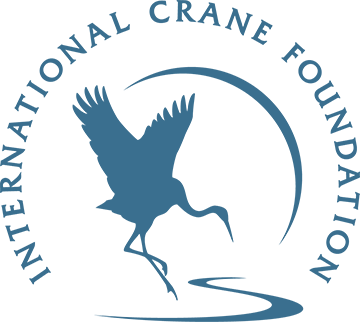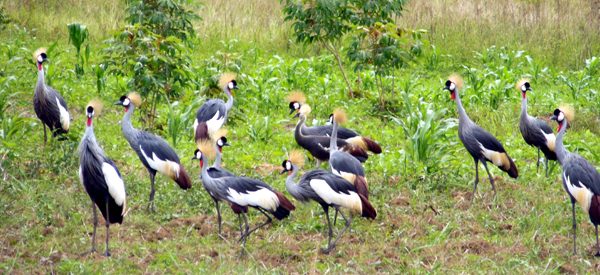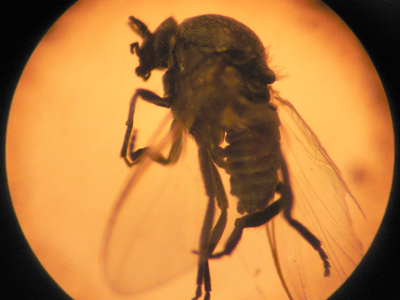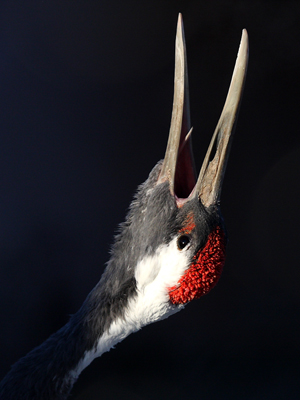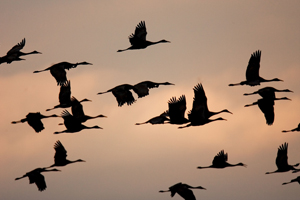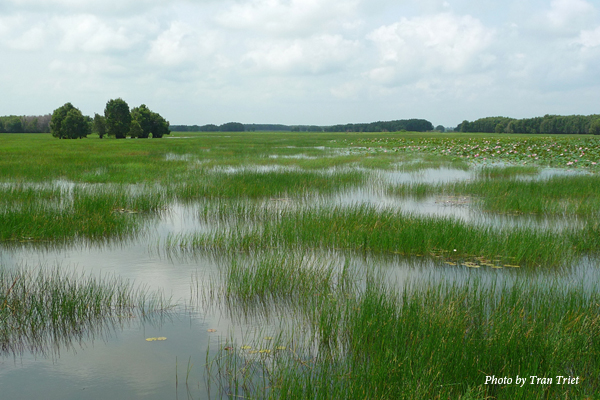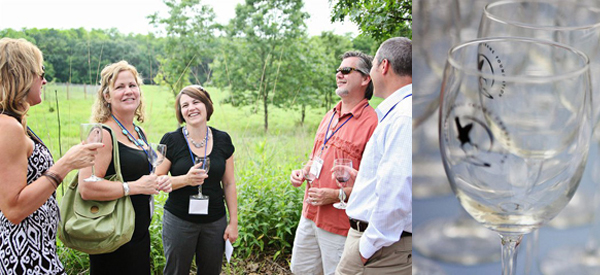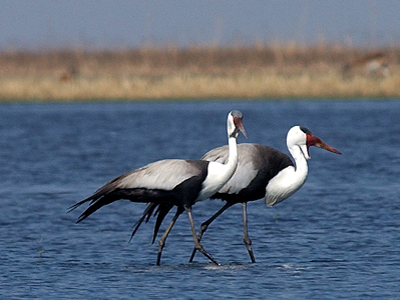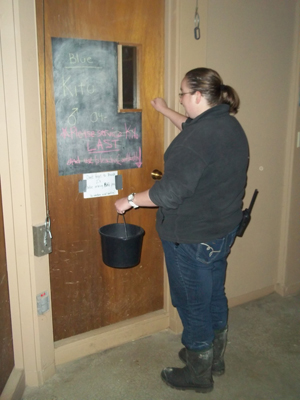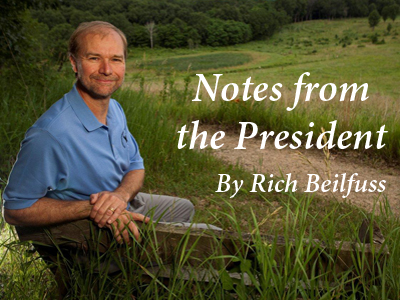 ICF President Dr. Rich Beilfuss recently returned from a three-week field visit to advance ICF’s Africa Program in three important “crane countries” — Uganda, Rwanda, and Zambia. Following are his field notes from Uganda, detailing the community-based efforts to protect the remaining Grey Crowned Cranes and their habitats in this country.
ICF President Dr. Rich Beilfuss recently returned from a three-week field visit to advance ICF’s Africa Program in three important “crane countries” — Uganda, Rwanda, and Zambia. Following are his field notes from Uganda, detailing the community-based efforts to protect the remaining Grey Crowned Cranes and their habitats in this country.
Category: Newsroom
BLOOM!
 Professional photographer, Tom Lynn, has been photographing acres of magnificent native plants and panoramas at ICF since May of last year. He is a storyteller with a lens — helping us tell the story of ICF’s connection to ecosystem restoration — efforts that began back in 1979 to restore prairie, savanna, wetland, and woodland communities at our headquarters site in Wisconsin.
Professional photographer, Tom Lynn, has been photographing acres of magnificent native plants and panoramas at ICF since May of last year. He is a storyteller with a lens — helping us tell the story of ICF’s connection to ecosystem restoration — efforts that began back in 1979 to restore prairie, savanna, wetland, and woodland communities at our headquarters site in Wisconsin.
Black Flies, Fake Nests and Planes!
 ICF’s Field Ecology Department (FED) staff are continuing their study of nesting Whooping Cranes in central Wisconsin and factors that may lead to nest abandonment. One hypothesis is that biting black flies may be harassing the cranes, to the extent that the birds cannot remain on their nest for the full 30-day incubation period. Following is an account of our spring research involving black flies, insect traps and fake nests, and planes!
ICF’s Field Ecology Department (FED) staff are continuing their study of nesting Whooping Cranes in central Wisconsin and factors that may lead to nest abandonment. One hypothesis is that biting black flies may be harassing the cranes, to the extent that the birds cannot remain on their nest for the full 30-day incubation period. Following is an account of our spring research involving black flies, insect traps and fake nests, and planes!
Opening Day!
 On Sunday, April 15th the International Crane Foundation (ICF) officially opens to visitors and our performers (the cranes) are dusting off their feathers, dancing and bugling to get ready.
On Sunday, April 15th the International Crane Foundation (ICF) officially opens to visitors and our performers (the cranes) are dusting off their feathers, dancing and bugling to get ready.
Voice Your Opinion on Sandhill Crane Hunting in Wisconsin
 In early February 2012 Wisconsin State Representative Joel Kleefisch introduced a bill proposing a regulated Sandhill Crane hunt in the state, citing the need to control crop damage by cranes. Though this bill never made it to a vote during this spring’s legislative session, a Sandhill Crane hunting bill will likely be introduced again in the future. For now, the state’s discussion on the Sandhill Crane hunting issue will continue in forums like the upcoming Conservation Congress meetings on April 9, 2012.
In early February 2012 Wisconsin State Representative Joel Kleefisch introduced a bill proposing a regulated Sandhill Crane hunt in the state, citing the need to control crop damage by cranes. Though this bill never made it to a vote during this spring’s legislative session, a Sandhill Crane hunting bill will likely be introduced again in the future. For now, the state’s discussion on the Sandhill Crane hunting issue will continue in forums like the upcoming Conservation Congress meetings on April 9, 2012.
Sarus Crane Wintering Area Wetland of International Importance
 For more than 25 years, ICF has been deeply involved in the establishment and management of what is now Tram Chim National Park, the largest wetland conservation area in the Mekong River Basin of Southeast Asia. Earlier this year, Tram Chim was designated a Wetland of International Importance through the Ramsar Convention, an international treaty for the conservation and wise use of wetlands.
For more than 25 years, ICF has been deeply involved in the establishment and management of what is now Tram Chim National Park, the largest wetland conservation area in the Mekong River Basin of Southeast Asia. Earlier this year, Tram Chim was designated a Wetland of International Importance through the Ramsar Convention, an international treaty for the conservation and wise use of wetlands.
An Evening with the Cranes 2012
 An Evening with the Cranes will be held at ICF’s headquarters in Baraboo, Wisconsin from 5:00 to 8:00 pm on Saturday, June 23, 2012. Tickets are $60 per person/$100 per couple.
An Evening with the Cranes will be held at ICF’s headquarters in Baraboo, Wisconsin from 5:00 to 8:00 pm on Saturday, June 23, 2012. Tickets are $60 per person/$100 per couple.
Inspired by the regions where cranes live, people can expect delicious food and wine pairings created by Jim and Christine Dickey, owners of Little Village Café in Baraboo. Ignite your senses with exotic flavors, crane calls, and gorgeous trails winding through our prairie. During the evening you will have the opportunity to meet ICF Co-founder Dr. George Archibald, ICF scientists, educators, and of course, cranes!
Major Conservation Victory in Mozambique!
 The International Crane Foundation (ICF), together with World Wide Fund for Nature (WWF) and the Museum of Natural History and other key partners in Mozambique, congratulate the Government of Mozambique for their wise decision to not allow the dredging of the lower Zambezi River and Delta for coal barging.
The International Crane Foundation (ICF), together with World Wide Fund for Nature (WWF) and the Museum of Natural History and other key partners in Mozambique, congratulate the Government of Mozambique for their wise decision to not allow the dredging of the lower Zambezi River and Delta for coal barging.
ICF’s President and CEO, Dr. Richard Beilfuss, was deeply involved in preparing the Environmental Impact Assessment and subsequent communications with the Mozambique Ministry of Environment concerning the need for a holistic, ecosystems approach to Zambezi River basin development.
Knock, knock…Who's there?
 Knock before entering… A common courtesy, for example, when visiting a friend or relative’s home. Believe it or not, this simple concept can also be applied as a training tool to help calm nervous birds. A ‘knock’ signals to a bird that an aviculturist will be entering to do something in their space. This ‘something’ can be any number of routine husbandry tasks: from checking food and water buckets, to entering the pen with a large bucket to clean. Sometimes, a knock may just mean someone is coming to look in at you and toss you a treat.
Knock before entering… A common courtesy, for example, when visiting a friend or relative’s home. Believe it or not, this simple concept can also be applied as a training tool to help calm nervous birds. A ‘knock’ signals to a bird that an aviculturist will be entering to do something in their space. This ‘something’ can be any number of routine husbandry tasks: from checking food and water buckets, to entering the pen with a large bucket to clean. Sometimes, a knock may just mean someone is coming to look in at you and toss you a treat.
Notes from the President
 Conservation leadership is at the heart of ICF’s global mission to save cranes and the diverse ecosystems, watersheds, and flyways on which they and all of us depend. We are dedicated to inspiring and empowering leaders at all levels. We provide training and practical experience for individuals and organizations engaged in community-based conservation, education, and outreach at key crane sites, building on their knowledge of cultural norms and practices. We also facilitate international leadership on key cross-cutting issues that affect cranes, such as sustainable water management. And sometimes conservation leaders find us, and together we tackle challenges beyond the reach of ICF alone. In this issue, we share stories from conservation leaders who are on the front lines of saving cranes and their landscapes on three continents.
Conservation leadership is at the heart of ICF’s global mission to save cranes and the diverse ecosystems, watersheds, and flyways on which they and all of us depend. We are dedicated to inspiring and empowering leaders at all levels. We provide training and practical experience for individuals and organizations engaged in community-based conservation, education, and outreach at key crane sites, building on their knowledge of cultural norms and practices. We also facilitate international leadership on key cross-cutting issues that affect cranes, such as sustainable water management. And sometimes conservation leaders find us, and together we tackle challenges beyond the reach of ICF alone. In this issue, we share stories from conservation leaders who are on the front lines of saving cranes and their landscapes on three continents.
